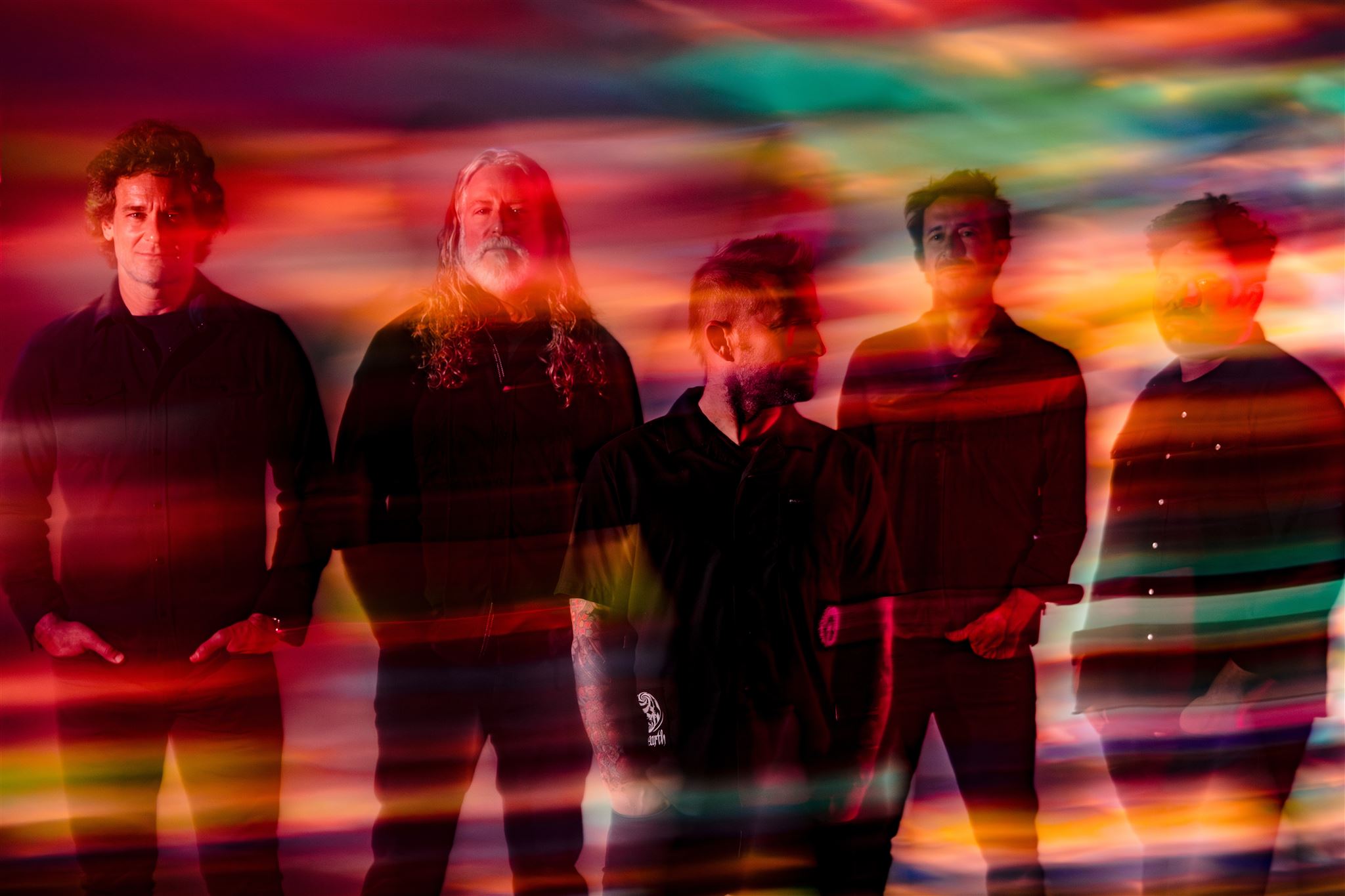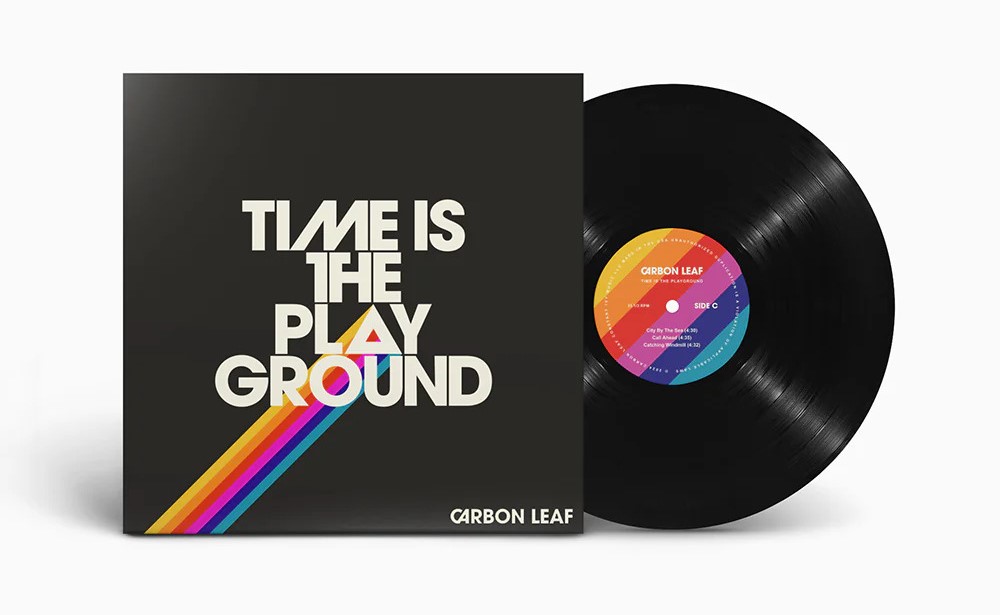
Carbon Leaf 2024 (Photography by Brittany Diliberto)
Barry Privett, Carbon Leaf’s frontman, speaks about their latest album, ‘Time is the Playground.’ Describing it as both a “call to action” and an “embrace of the moment,” he explores its themes, showcasing Carbon Leaf’s evolution while staying true to their indie folk rock sound.
Can you describe the themes of ‘Time is the Playground’.
We get into this mindset that time is cyclical, and that is comforting, and yet… it is linear and nothing really comes back. We have our seasons and our traditions and we clock them in looping increments, all the while marching straight towards an unavoidable destination. And so the title track, Time Is The Playground, is both a call to action to acknowledge that time really is all we have…and to embrace the moment you’re in, as if standing in a field, like a kid at play. Wouldn’t we all like to live there forever.
How does this album represent an evolution for Carbon Leaf while still staying true to your sound?
This album is different for us, in that it is a mix of new ideas, with some older demos revisited that we loved but never finished for one reason or the other, which plays nicely on the theme of eras or seasons in life getting blended together and out come something new from it’s original intent. There are 6-7 songs here that I had been picking up and putting down over the course of 15-18 years, just adding a little color and then not finding my way fully into the story and moving on. In revisiting material in this way, my perspective was now different, and the stories presented themselves in full form. Sometimes it just takes that long, and I’ve learned not to try and push something through prematurely. It’s frustrating to really like something you are working on, but for one reason or another, the passage is blocked. It’s rewarding when the patience to listen over time pays off eventually.
Our sound is all over the map and we like that because it presumes exploration is natural. So if it’s a pop song or a porch song…electric guitars, or fiddle and banjo…it just has to feel authentic to us. It has to have a heart. Otherwise everyone gets bored and it’s just another song on the heap.

Why the 10 year gap in-between albums, and what brought you back to this format?
We release 2 full length albums 6 months apart in 2013 and it nearly killed us. We decided to re-record the 3 albums we released while on Vanguard Records so that we could resume rights to the master recording, which we did in 2014, 2015, 2016. Then we released 2 5 song EPs, Gathering 1 and Gathering 2: The Hunting Ground. Then we spent a week at a beach cottage filming 27 live performances for a Blu-ray, and finally recorded a live concert film in Charlottesville and one in Towson, MD, both of which haven’t been released yet. So we were quite busy. We announced this new full-length project back in 2020, just as the pandemic was really taking root. We hadn’t anticipated the pivot we would need to make for a few years just managing the group and finding alternative ways for the band to operate. We had to cancel tour 4 times during that period, so we had to get creative, and so this album took longer than we’d anticipated.
The song ‘Backmask 1983’ has many 80s references. Can you tell me more about that and how did you choose which ones to include?
Good question! I have pages of references. The music for this demo is from 2008, and I loved it right away as it reminded me of a mix of AC/DC and The Cars or something. And so my mind raced to that era…and ultimately to my early teen years. I turned 13 in 1983, and looking back, it felt like one of the last analog years. It was a good time to be a kid. There were limits to what you could gain access to, and so you relied heavily on your imagination. This carried over into the adults in the room too. Basically you had 3 tv channels, FM radio, a newspaper, the library, landline telephones…if you wanted to see a movie, you had to go to a theatre, let alone see it more than once. Maybe your neighbor had the Encyclopedia Brittanica set, and the 7-11 had a good size magazine rack. And so your imagination filled in a lot of the gaps.
Satanic Panic was a real thing in certain circles growing up, and many adults were afraid. I grew up loving all of the mysterious things about being kid back then, and you wanted to believe in the mystery. The mystery was more the point than figuring it out. I wanted to roll some of that cultural context into the song. And so a lot of the things I chose for the narrative centers around what was captivating in the pop culture at the time, and run parallel with the mysteries of having one foot in your adolescence and all of those things that shaped you to this point, and having one foot racing into puberty and that transition into teen hood, with all of this new incoming information, where it felt fresh and exciting and mysterious. A mix of fear and exhilaration.
Carbon Leaf has achieved numerous milestones, including being the first unsigned act to win an American Music Award. How did that moment impact the band’s trajectory?
We had already been a band for 8 years and had release 4 albums and up to that point, without tons of outside help, were getting to the point we felt we had taken it as far as we could. The internet was just starting to really gain traction by now and there were a lot of .com startups that were hosting all these contests and giving away prizes and cash and so Terry would sit there on his lunch break and enter contests online…uploading our bio and a song (which took like 10 minutes to upload back then) and we actually won some crazy stuff. $20K for a song contest…and we got our song featured in a Pontiac commercial. It was the wild west. The American Music Award contest was another one, and thousands of bands entered, so it was a nice bump in just being a part of something which had like an 8 month arc to it, at a time when we really need the next bump.
A few radio stations picked up the story, of this unsigned band winning these rounds of, essentially a Battle of the Bands contest, and they started spinning the song associated with the contest, just content for listeners. And so our song, ‘The Boxer’, started getting call-ins and gained some traction, which added to the story. We won the AMA and performed live on the broadcast, which was the first time an unsigned band had done so. We had just finished our 5th album, Indian Summer, and Vanguard Records asked to do a deal, and so we licensed it to them, and our single, Life Less Ordinary went to radio and charted well at AAA and Hot AC, which allowed us to expand our touring beyond the east coast and midwest. With some key radio support out west and in the Pac NW, it allowed the band a U.S. touring base.
You’ve had a lot of success as an independent band. What are the challenges and rewards of that path?
Really the biggest trick is to just weather and manage the dips that come with being an independent artist over the long haul. We have been lucky to seize on some opportunities to forge a little bit of an unconventional path. It’s a bit of a paradox…there’s more freedom, but we also manage everything ourselves, so there are limitations. The way music is consumed always keep you on your toes trying to figure out what is useful, and what is tail-chasing. Time is our biggest challenge…creating and promoting everything on your own is tough. But the reward is, no one is controlling you.
The band has self-recorded and re-released albums to regain publishing rights. How has this decision impacted your creative freedom and business model?
We were independent for the first 10 years, then were on a label for 5, and then went independent again in 2010 and it’s a lot of work. You trade a lot of plug-and-play marketing opportunity and relief when you are on a label, but you pay in other ways. With cross-collateralization of album sales, if you don’t have hit after hit, the model becomes a high-interest loan with reduced revenue and mounting debt…and diminishing returns on what the label is willing to offer going forward.
We own 100% of our catalogue, and we play to our fans who so far have remained loyal. Expanding is very hard, but we keep an eye on opportunities. The key though is to just really keep your focus on the fans paying attention and not find yourself always wanting to fish elsewhere. And we certainly aren’t 22 anymore, which is when we had all the time in the world. Now, with the guys having families, there is a lot more to consider….back to that Time theme…and so there is more of a Life balance that is being pursued, in exchange for the endless touring and time spent in the studio.
What has been the key to maintaining the band’s cohesion and creative spirit over the years?
We are pretty good at grinding through the uncomfortable, unsexy parts of running a band. We invest in excellent production team members when we are on the road and put it all on the stage. We do our best to communicate our thoughts and feelings to one another and talk through anything that is creating tension. It’s not perfect, but it’s better than average. And getting ideas to market is energizing. We can be tired, but if we can latch on to a good idea, then that puts wind in our sails.
How have your personal and musical relationships of the group evolved over the years?
We all met in college, and so it all started more as friendships, than responding to ads to join a band. That goes a long way, as there is a history there. Terry and Carter were just noodling on acoustic guitars in the dorm for fun…Terry and I studied abroad in Ireland and London for a semester. Tons of life stuff in between then and now. Our studio is at Terry’s house, so I do see him and his family a lot, as there is a fair amount of chaos that revolves around the studio and band operations. I have spent many a night at the studio as we we work on various projects.
But lately, we are not all up in each others grills like we used to be with all the time in the world on our hands – everyone’s responsibilities and priorities shift when families start to grow – but we distill what is most important to focus on when it matters the most, and get creative to find the time necessary to get the work done. It’s more surgical. We can’t always get in a room together any time we want, but we can always exchange ideas online, and then really distill a plan for when we do get together. Gone are the days we’d spend 12 hours in the studio, or rehearse all day or night. Those things are managed in between soccer practice, car pooling, horseback riding, ice skating, broken legs, ear infections, dinner time, and family vacations.
Your US tour spans a lot of cities. Is there a particular stop you’re most excited about?
I always say my favorite stop is the one where people show up! But I do love getting out west, where the road opens up, the sky gets big, the billboards disappear for a while. There are markers on the tour that feel great…making it south to Austin….getting to the west coast. Getting in to Seattle for a two day stand….making it to Denver…and then winding through the midwest as things get closer together again, feels good. September into October is 30 shows in as many days, and it’s brutal. But it’s satisfying in its brutality because it pushes you way outside your comfort zone, which is good to do a few times a year, where you feel like a walking bag of bones.
Coming back through in October and November feels good, with the air changing. November and December, while you are burned out, is invigorating because you feel it’s more of a homecoming…getting into Maine, VT, MA…and the stops back down to home in Virginia. It’s a nice trip, and we are lucky to be able to tour the U.S. and have enough people interested to afford us the privilege.
What’s next for Carbon Leaf after the album and tour?
I am starting to think about 2025 now. Likely, I will be itching to get back into writing as soon as december hits and eye a release for 2025. We have a southern tour in January, as well as a floating music festival in the Caribbean called String Break.
Further information
Carbon Leaf’s new album ‘Time Is The Playground’ is released on September 27: carbonleaf.com




